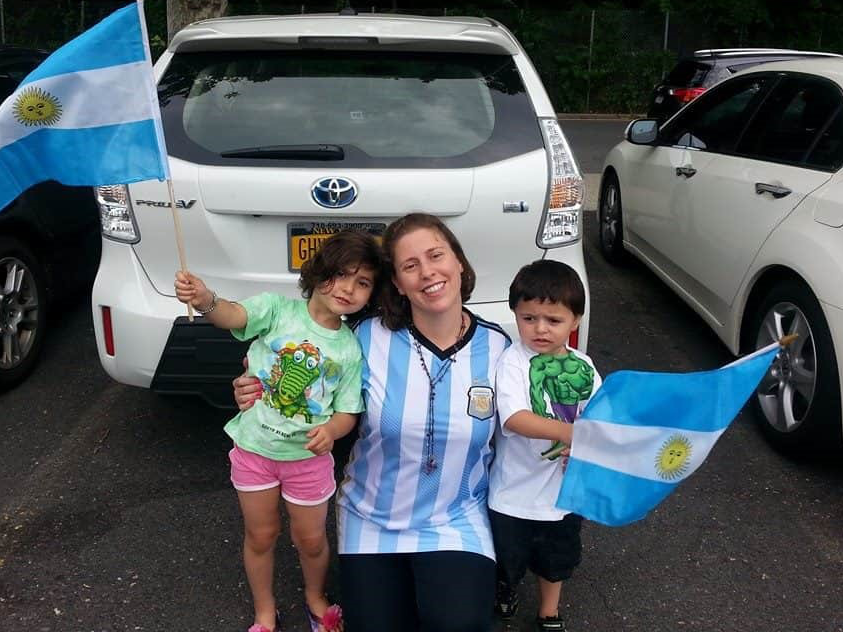As a seventh grader in Buenos Aires, an event occurred that had a profound impact on me: The 1992 terrorist attack on the Israeli embassy, which left 29 dead and more than 200 injured. I vividly remember the raw pain we Argentinian Jews experienced that day, as well as the very graphic photos of the victims that were printed in the magazines. How could this happen in our country? As a child, you think the adults will always protect you, but when this happened, my peers and I realized how vulnerable we were.
Later that year, I was selected to escort the Israeli flag during a Yom Haatzmaut celebration for the students of all the local Jewish day schools and their families. This was an honor given to the student with the best grades. Thousands of Argentinian Jews gathered for the ceremony, which was held in a huge stadium. It was very moving to hear all of them singing “Hatikvah” together in the heart of South America. I was filled with pride that day.

The author, third from left, escorting the Israeli flag at her seventh grade graduation ceremony. (Courtesy)
To its Jewish citizens, Argentina has been both a savior and a culprit. It welcomed thousands of Jewish immigrants from Europe before and after World War II, along with Sephardic Jews who escaped persecution in Arab countries. It also provided a safe haven to Nazis like Adolph Eichmann, who was tracked there and captured by the Mossad in 1960. We are still waiting for justice to be done in the case of the embassy bombing and the 1994 terrorist attack on the Asociación Mutual Israelita Argentina (Argentine Israelite Mutual Association, or AMIA), in which 85 were killed and more than 300 injured. It is hard to come to terms with our country’s dark history.
My ancestors came to South America with hopes for a better future. While my family didn’t directly experience the Holocaust themselves, it certainly scarred them. My maternal grandmother, Chola Mandelman, escaped Poland at the age of 4. My maternal grandfather, Natalio Rabenbach, was a proud Argentinean who served in the army’s Cavalry division. On my father’s side, my grandfather, Elias Solovey, arrived in Buenos Aires prior to World War II from White Russia, and my grandmother, Maria Ainshten, arrived from Poland on one of the last boats to land before the outbreak of the war.
Between 1912 and 1983, Argentina alternated between periods of democratic rule and periods of military rule. My father, Isidoro Solovey, was raised with profound socialist ideas but ultimately became a centrist as an adult. When I was six years old, he took our family to Plaza de Mayo, in the center of Buenos Aires, for a rally in support of President Raúl Alfonsín, who is considered “the father of modern democracy in Argentina.” There had been an attempt by some rogue members of the army to remove him from power, and thousands took to the streets. That experience showed me how important democracy was for my family, as well as for the country as a whole.

The author, first row second from right, with her father’s family in Buenos Aires. (Courtesy)
In Argentina, we are just as passionate about soccer as we are about politics. My father was a fervent soccer lover. When my sister was born, he was torn between attending the birth and missing Club Atlético River Plate play “el clasico.” Fortunately, he did attend the birth! He passed his love for River Plate onto me and my siblings, Marina and Dan. Lucky for him, my mom Ada always was understanding of his passion for soccer. In truth, the two of them made the best team. They taught me a lesson on unconditional love and true friendship.
Today, the Jewish community in Argentina is very vibrant, with around 200,000 members. Buenos Aires is still in my heart, but New York is my home. New York is the place where I met and married my husband, Victor Mizrahi, who is a half-Syrian, half-Egyptian Sephardic Jew. It is where my three beautiful kids—Sofia, Albert and Jack Natalio—were born. Yet I still love to blast Spanish music in my car and sing along. I cry when I see a documentary showing the streets of Buenos Aires. I love Ricardo Darín movies because they bring back memories of my childhood, including the expressions my father used to say.
We are living in uncertain times; we are going through a pandemic that fills us with fear and uncertainty. These are the moments that bring out the worst and the best in people. I’m hoping that the best of our human spirit can rise to the occasion so we can start taking care of one another. Let’s dig deep for human compassion and empathy for each other and the rest will follow. The answers will eventually come to us.







